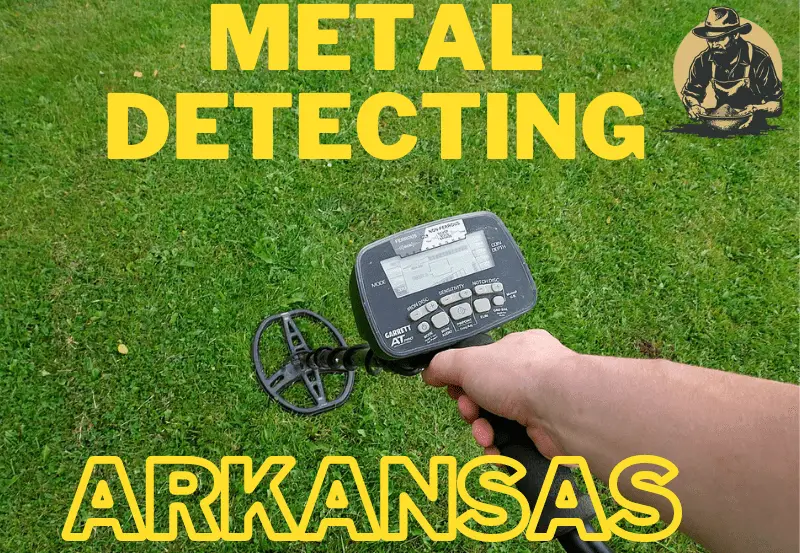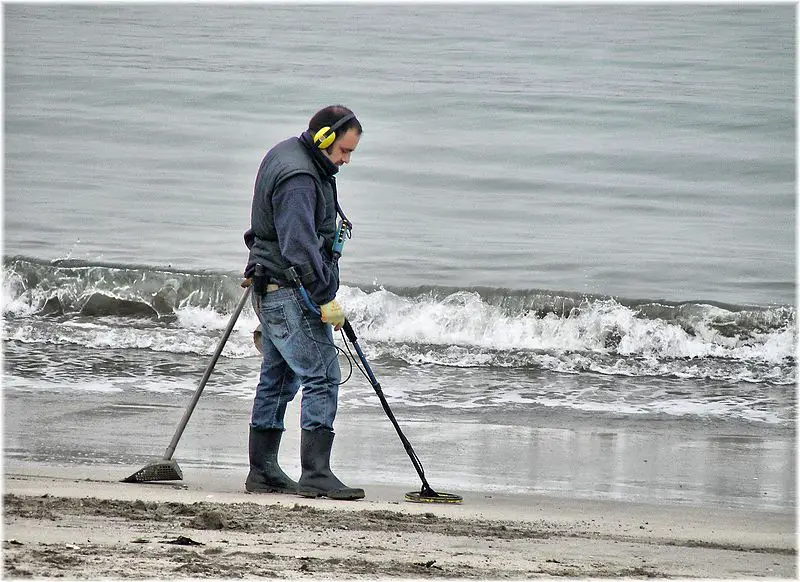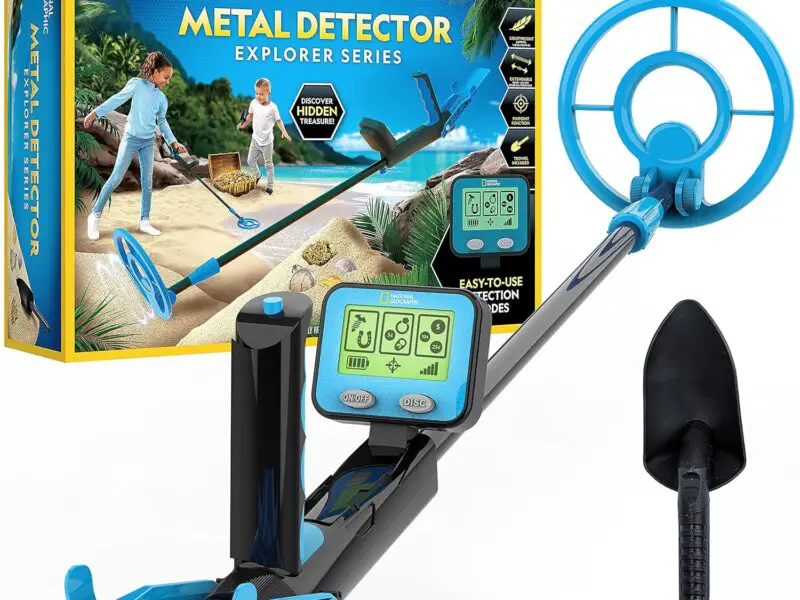Get ready to embark on an exciting treasure-hunting journey as we present to you “Exploring Treasures: The Complete Guide to Metal Detecting in Arkansas.” Whether you’re a seasoned adventurer or new to the thrill, this guide is your ultimate companion in uncovering hidden gems across the beautiful state of Arkansas. From historic sites to scenic parks, we’ll reveal the best locations, essential equipment, and expert tips to help you make the most of your metal detecting escapades. So, grab your detector and get ready to unleash your inner explorer as we dive deep into the fascinating world of metal detecting in Arkansas.

History of Metal Detecting in Arkansas
Metal detecting in Arkansas has a rich and fascinating history that dates back several decades. Early enthusiasts of this hobby would often venture out into the fields and forests of Arkansas in search of hidden treasures. These pioneers would use rudimentary metal detectors, which were much simpler compared to the advanced models available today. Over the years, metal detecting evolved from a solitary activity to a popular pastime enjoyed by many.
Early Beginnings of Metal Detecting in Arkansas
The roots of metal detecting in Arkansas can be traced back to the early 1900s when hobbyists started exploring the vast landscapes of the state in search of historical artifacts and buried treasures. Armed with basic metal detectors, these early enthusiasts would painstakingly sweep the ground in hopes of unearthing something valuable. Although their equipment was rudimentary compared to today’s technology, their passion for uncovering history laid the foundation for metal detecting as a popular hobby in Arkansas.
Growth of Metal Detecting as a Hobby
Metal detecting gained significant popularity in Arkansas during the mid-20th century as advancements in technology led to the development of more sophisticated metal detectors. These new and improved devices allowed hobbyists to detect metal objects buried deeper in the ground and with greater accuracy. As a result, more and more people became interested in the hobby, leading to a surge in metal detecting clubs and associations across the state.
Famous Metal Detecting Finds in Arkansas
Over the years, metal detecting enthusiasts in Arkansas have made several noteworthy discoveries that have captivated the public’s attention. One such find was the discovery of the Hollenberg Colt, an extremely rare and valuable firearm dating back to the 19th century. This remarkable find not only showcased the potential of metal detecting in uncovering hidden treasures but also highlighted the importance of preserving Arkansas’s rich history.
Laws and Regulations for Metal Detecting in Arkansas
Before embarking on your metal detecting adventures in Arkansas, it’s crucial to familiarize yourself with the laws and regulations surrounding this hobby. This ensures that you have an enjoyable experience while respecting the state’s heritage and protecting its natural and cultural resources.
Read more about the laws here
Legalities of Metal Detecting
Metal detecting is generally allowed in public areas, such as state parks and national forests, as long as you adhere to the rules and regulations set forth by the managing authorities. However, it is important to note that metal detecting is prohibited in archaeological sites, historical landmarks, and private properties without the owner’s permission.
Permit Requirements
In Arkansas, a permit is not required for recreational metal detecting in most public areas. However, it is always recommended to check with the specific site or park you plan to visit, as some locations may have additional regulations or permit requirements.
Protected Sites and Areas
To ensure the preservation of Arkansas’s cultural and historical heritage, certain sites and areas are protected, prohibiting metal detecting activities. It is important to familiarize yourself with these protected sites and areas to avoid any unintentional damage or violation of regulations. The Arkansas State Historic Preservation Office and the Arkansas Archeological Survey are valuable resources for information on protected sites and areas.
Choosing the Right Metal Detector for Arkansas
Selecting the right metal detector is crucial to optimize your metal detecting experience in Arkansas. With various models and features available, finding the perfect detector can be overwhelming. Consider the following factors when making your decision:
Types of Metal Detectors
There are several types of metal detectors to choose from, including VLF (Very Low Frequency) detectors, PI (Pulse Induction) detectors, and multi-frequency detectors. Each type has its own strengths and weaknesses, so it’s essential to understand the differences and choose one that best suits your needs.
Read our detailed metal detectors review here
Features to Consider
When selecting a metal detector for Arkansas, consider features such as discrimination capabilities, depth detection, waterproofing, and target response. Discrimination capabilities allow you to filter out unwanted metal signals, while depth detection helps identify how deep an object is buried.
Waterproofing is crucial, especially if you plan to go metal detecting near bodies of water or in wet conditions. Additionally, consider the weight and ergonomics of the detector, as comfort plays a significant role during long metal detecting sessions.
Recommended Models for Arkansas
Several metal detectors are highly recommended for use in Arkansas due to their reliability, performance, and suitability for the diverse terrain and soil conditions in the state. Some popular models include the Garrett AT Pro, Minelab Equinox 800, and Fisher F75. These detectors offer excellent depth capabilities, discrimination settings, and durability, making them ideal for the varied metal detecting opportunities in Arkansas. You can find great metal detectors here
@conkdetects Back in Arkansas! A nice silver ring to start things out! Thanks for being there friends!#metaldetecting #treasure #epic #silver #ring#jewelry #awesome #tiktoklive
Preparing for Your Metal Detecting Adventure
Before venturing out on your metal detecting adventure in Arkansas, it’s important to prepare thoroughly to maximize your chances of success. Here are some essential steps to follow:
Researching Metal Detecting Locations
Researching potential metal detecting locations is key to increasing your chances of finding valuable items. Seek out areas with a historical significance, such as battle sites, old homesteads, and areas where people congregated in the past. Online resources, metal detecting forums, and local historical societies can provide valuable information about potential hotspots.
Essential Equipment and Tools
In addition to a metal detector, several essential tools can enhance your metal detecting experience in Arkansas. These include a digging tool or trowel, a pinpointing probe, a sturdy bag or pouch for storing your finds, gloves, and a comfortable and sturdy pair of shoes. It’s also advisable to carry a first aid kit and stay hydrated during your outings.
Safety Precautions
Metal detecting in Arkansas’s diverse terrains can present certain risks and challenges. Ensure your personal safety by wearing appropriate clothing and protective gear, such as a hat and sunscreen to protect against the sun’s harmful rays. Be cautious of potential hazards, such as poisonous plants, wildlife, and rough terrain. Remember to respect the environment and fill any holes you dig to maintain the integrity of the locations you visit.
Top Metal Detecting Locations in Arkansas
Arkansas offers a wealth of metal detecting opportunities, with various locations containing hidden treasures waiting to be discovered. Here are some top metal detecting locations in the state:
Crater of Diamonds State Park
Crater of Diamonds State Park is a popular destination for metal detecting enthusiasts due to its unique feature – it is the only diamond-producing site in the world open to the public. The park’s plowed diamond field provides a fertile ground for both novice and experienced metal detectorists to search for valuable gemstones as well as other historical artifacts.
Hot Springs National Park
Hot Springs National Park is another fantastic location for metal detecting in Arkansas. With its rich history dating back to the Native American tribes who once inhabited the area, there is a high potential for uncovering artifacts and relics. Be sure to follow the park’s regulations and obtain any necessary permits before metal detecting within the park boundaries.
Buffalo National River
Buffalo National River is a treasure trove of history and natural beauty. Metal detecting along the riverbanks presents an opportunity to stumble upon relics from the early settlers and Native American tribes that once inhabited the area. However, it is essential to respect the park’s regulations and avoid any environmentally sensitive areas.
Ozark National Forest
The vast expanse of Ozark National Forest offers metal detecting opportunities amidst stunning landscapes. With its rich history and deep-rooted heritage, the forest can yield valuable artifacts and coins. Research specific areas within the forest, such as old home sites or historical trails, for the best chances of success.
Tips and Techniques for Successful Metal Detecting
While having the right equipment and choosing the right locations are crucial, employing the correct techniques and strategies can significantly impact your success as a metal detectorist in Arkansas. Consider the following tips and techniques:
Using Discrimination Settings
Discrimination settings allow you to filter out unwanted signals from certain types of metals, such as nails or bottle caps, while still detecting valuable items. Adjusting the discrimination levels according to the specific location and type of metal you are targeting can help optimize your finds.
Best Times to Detect
The best times for metal detecting in Arkansas are during the drier seasons when the ground is less saturated. Spring and fall can offer optimal conditions for metal detecting, as the soil is often easier to dig and objects may be more visible.
Effective Search Patterns
Employing effective search patterns can help ensure thorough coverage of an area. Common search patterns include grid patterns, spiral patterns, and zigzag patterns. Experiment with different patterns to find the most suitable one for the terrain and the size of the area you are searching.
Cleaning and Preserving Your Metal Detecting Finds
Once you have made a remarkable find, it is essential to clean and preserve your discoveries to maintain their condition and historical value. Consider the following steps:
Basic Cleaning Techniques
Use gentle cleaning techniques to remove dirt and debris from your finds without damaging them. Soft brushes, water, and mild soap can help remove surface dirt. Avoid harsh chemicals or abrasive materials that can potentially harm delicate artifacts.
Identifying and Assessing Artifact Value
Researching and identifying the artifact you have found can provide valuable insights into its historical significance and potential value. Consult reputable sources, such as historical experts or museum curators, to determine the historical context and potential value of your find.
Long-term Preservation Methods
To ensure the long-term preservation of your metal detecting finds, protect them from exposure to moisture, extreme temperatures, and direct sunlight. Consider storing your artifacts in acid-free archival materials or display cases to maintain their integrity and prevent deterioration over time.
Joining Metal Detecting Clubs and Associations
Joining a metal detecting club or association in Arkansas can greatly enhance your metal detecting experience. These clubs offer numerous benefits, including:
Benefits of Joining a Club
Metal detecting clubs provide a platform for enthusiasts to connect with like-minded individuals who share the same passion for the hobby. Engaging with fellow hobbyists allows you to learn from their experiences, share tips and techniques, and participate in group outings and events.
Club Activities and Events
Metal detecting clubs often organize a range of activities and events, including group hunts, competitions, and educational workshops. These opportunities allow you to expand your knowledge, learn new techniques, and build lasting friendships within the metal detecting community.
Networking with Fellow Hobbyists
Networking with fellow hobbyists through metal detecting clubs provides access to a wealth of knowledge and resources. Members can exchange information about potential hotspots, new equipment, and valuable tips for successful metal detecting adventures in Arkansas.
Frequently Asked Questions About Metal Detecting in Arkansas
Here are some commonly asked questions regarding metal detecting in Arkansas:
Can I metal detect in Arkansas state parks?
Metal detecting is generally allowed in Arkansas state parks, but it’s best to check with the individual park’s regulations and specific rules before conducting metal detecting activities. Certain areas within the parks may have restrictions or permit requirements, so it’s important to be aware of any limitations to ensure compliance.
What are some common finds in Arkansas?
Arkansas is rich in history, offering a wide range of potential finds for metal detectorists. Common finds include coins, jewelry, Civil War relics, Native American artifacts, and items from early settlers and homesteads.
Can I sell the artifacts I find?
It’s essential to familiarize yourself with state and federal laws regarding the sale of artifacts. In general, it is illegal to sell artifacts obtained from protected sites, historical landmarks, or archaeological areas in Arkansas without proper authorization. Selling artifacts found on private property also requires permission from the landowner. It is crucial to follow ethical practices and adhere to the laws to preserve Arkansas’s heritage.
Conclusion
Metal detecting in Arkansas provides an exciting opportunity to explore the state’s rich history and uncover hidden treasures. By understanding the history of metal detecting in Arkansas, respecting the laws and regulations, choosing the right equipment, and employing effective techniques, you can enhance your chances of making exciting finds. Remember to also prioritize preservation by cleaning and storing your discoveries properly. By joining metal detecting clubs and associations, you can connect with fellow enthusiasts, expand your knowledge, and participate in engaging activities. Whether you are a seasoned detectorist or a beginner, Arkansas offers a wealth of possibilities for a remarkable metal detecting adventure.




